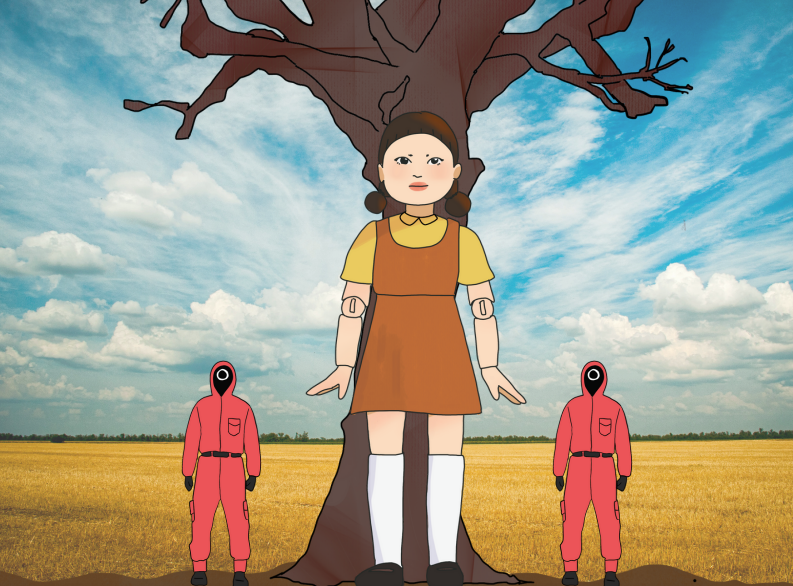Unexpected discoveries of childhood memories in Squid Game
November 11, 2021
“Have you watched the show ‘Squid Game?’” my dad asked me on Sunday evening.
He started talking about how “Squid Game” was brought up in his work conference, questioning me with a curious look that wanted me to introduce him to the story. Unfortunately, that was the first time I ever heard of “Squid Game,” and I was not able to meet his expectations.
My mom, who stood in the kitchen making dinner, joined the conversation immediately as she heard the words ‘Squid Game’. She recalled the squid game that she played a lot in her childhood, not noticing he was talking about it as a Netflix series. They shared their childhood experiences, playing the various games while I was eating dinner silently.
The next day, when I faced an awkward moment from my friends as I confessed I had not watched “Squid Game,” some kind of bad feeling took place inside my mind. Maybe it was that the feeling of embarrassment of not knowing a popular Korean show or my desires of wanting to be on trend. As my Korean friends started posting on their Instagram stories about the show, the nervous feeling grew increasingly, and later, I found myself in front of the screen watching the trailer of “Squid Game.”
On Wednesday night, I logged into my Netflix account, which had not been activated for nine months and started to watch the first episode. Overcoming my negative preconception toward the Netflix series, I finished the entire show in two days, staying up until 3 a.m.
Now, I was able to introduce the story to my dad, join the reminiscing conversation at my dinner table and understand the memes posted on my friends’ Instagram. More importantly, six games on the episode—which are commonly played in Korea— reminded me of a precious memory that I had forgotten for a long time.
Throughout my childhood, playing various games in a small playground near my house was my favorite thing to do. Every time I realized my parents would come home later, I immediately sensed a silence that made me think of strangers inside my closet. Trying to get rid of this fear, I stepped out of the house and arrived at the most comfortable place in the world: the playground, where many kids were playing games altogether.
The easiest game for us was Mugunghwa flower has blossomed, known as Red Light, Green Light, which appeared in the first episode of the “Squid game”. While some kids moved quickly, I was always the one in the back who moved little by little, afraid of being caught or recognized by IT. I know. That was the most boring way to play the game, but my unwillingness to be a leading person was bigger than the excitement of the game. However, there was one time I became an active player in this game. One of my friends encouraged me to touch the IT, which is the way to win a game if you come back to the start line without being caught. I moved quickly when the game started, followed by my friend as I didn’t even realize other kids were far behind us. I will never forget the thrilling moment of touching the IT’s back and returning to the start line successfully.
As I entered elementary school, I was able to experience various kinds of games, which required more money and materials than the games I used to play in kindergarten. With my obsession toward street games, my favorite was the dalgona ppopgi, which appeared in episode three. If you successfully pull the shape out of dalgona—honeycomb flat candy made of melted sugar—you can get small prizes such as stickers or candy, which was the biggest gift for a 9 years-old kid. Crouching down on the ground and removing shape with shaking hands: it was a small but precious memory I had in elementary school.
In middle school, I started to actively participate in school events as a member of the student council. On sports day, the Juldarigi, known as the tug of war, was the finale of the day. Entire students and sometimes teachers are evenly divided to two sides, pulling the opposite ends of a rope. Without strategies or techniques shown in the show, we only relied on our strengths, following the shout of the person in the front. Every time I pulled the rope, I felt like I was pulling the wall that would never break. Facing the heavy wall, I got easily exhausted and wanted to release the rope from my hurting hands. However, the cheers and efforts from friends made me keep pulling the rope, eventually bringing the rope to one side. The cooperative and community spirits I felt that day still inspire me.
An unexpected discovery of childhood games in the “Squid Game” reminded me of precious memories that I missed as I have grown up: wandering around neighbors to gather friends, playing street games instead of continuously watching youtube, and interacting with other kids until our parents came to pick us up. Today, I’m hoping to have another conversation with my parents at the dinner table, and this time, as an active speaker who shares my childhood recollections.












